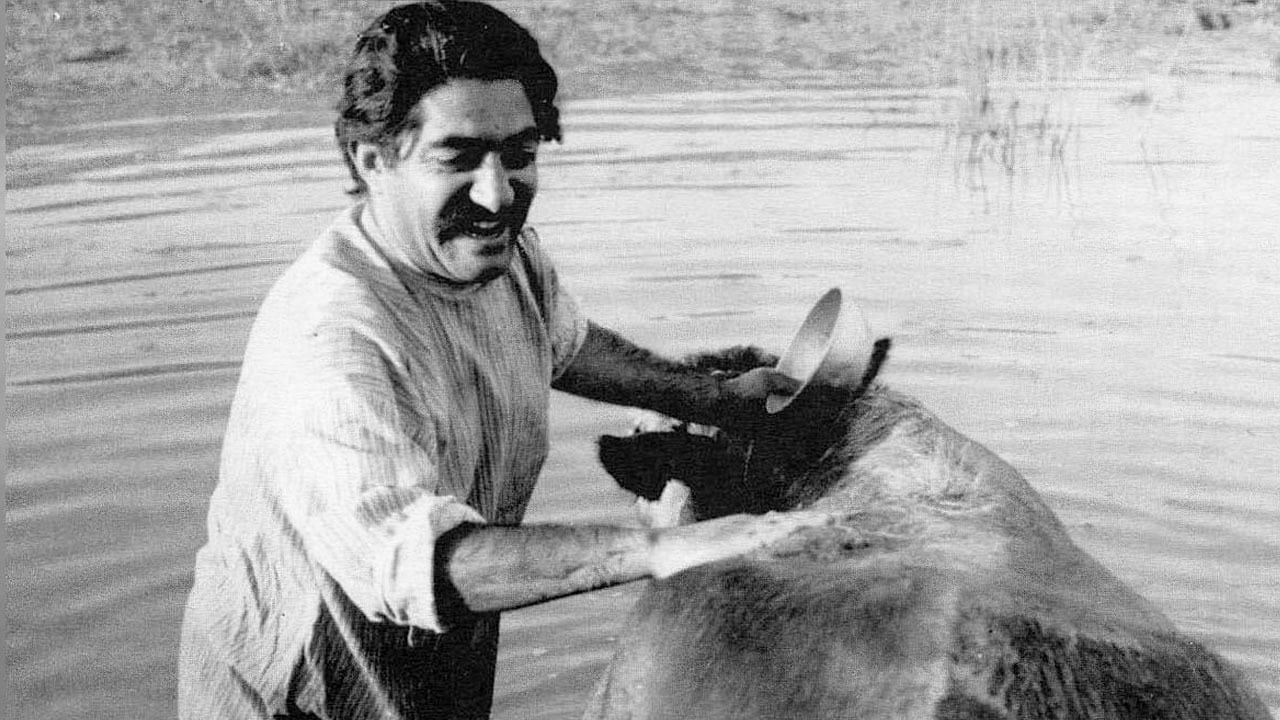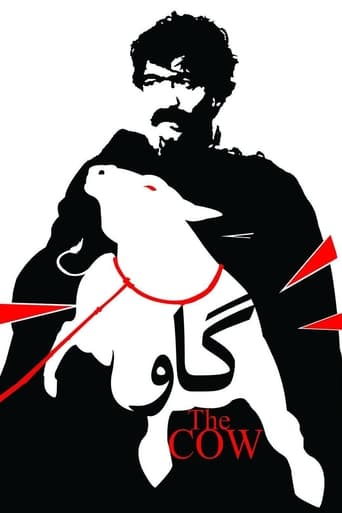

The title of this Iranian film made it really obvious what the story would involve, but not necessarily in the way you would expect, I found it listed in the book 1001 Movies You Must See Before You Die, and I hoped it would be worth it. Basically in a remote and desolate village, middle-aged villager Masht Hassan (Ezzatolah Entezami) has a close relationship with his cow, the only one in the village, Hassan is married, but has no children. When Hassan goes away for a short time, the villagers look after his beloved and pregnant cow, but they find it dead. Knowing how much Hassan cherishes the cow, the villagers fear his reaction when he returns, so they decide to cover up the death and dispose of the corpse. When Hassan returns, they have covered up all evidence of the death, and they lie to him, telling him that the cow ran away. Hassan is unconvinced that his cow would ever run away, he is devastated and finds great difficulty in confronting by his loss, and the loss of livestock affects his social stature in the village. Hassan starts to spend more time in the barn, his grieving pushes him over the edge, and he has a nervous breakdown. Hassan goes insane and has developed boanthropy, a psychological disorder in which he believes himself to be a bovine, in other words, he believes he is the cow. Hassan has incorporated many cow-like mannerisms, including walking on his hands and knees, and eating hay, and the villagers cannot snap him out of it. In the end, his wife (Mahin Shahabi) and the villagers try a drastic method to cure his insanity, tie him up and drag him up a hill, it ends in tragedy when he runs away, and he falls to his death. Also starring Jamshid Mashayekhi as Abbas, Ali Nassirian as Islam, Khosrow Shojazadeh as Boy and Jafar Vali as Kadkhoda. I can see why this is considered an influential film, apparently it was banned as well, it is a very simple story, with themes of poverty, superstition and paranoia, it is both strange and fascinating to watch, a terrific drama. Very good!
... View MoreThis movie recalls Pasolini in mind, and also Parajanov.The subject is as simple as it can be: there is a village, poor and primitive, Hassan is the only one possessing a cow in the village, the cow dies, Hassan gets mentally insane.Is Hassan mad? Well, obviously. A man who believes that he is no more himself, but his cow, that's madness on all accounts.Madness? Hassan was living in his own universe ignoring the real world. But here's the point: Hassan had always lived in his own universe - he and his cow. A whole system of memories: events lived together. Natural phenomenons lived together and having a particular significance for them: a whole system of codes and signals. Was it full moon? It meant the cow was thirsty.This universe could not disappear once the cow was no more. The memories were still in place. The codes and signals were still in place. Was it full moon? It meant the cow was still thirsty.So Hassan was just defending now this universe of him; only his universe was no more fit with the world. Hence, the madness.Usually, when the beloved one is no more, the survivor is tempted to imagine that the other is still somewhere, not far. You go to the cemetery and speak to your beloved one, who is buried there. Hassan was trying something more forceful: to imagine that he, Hassan was somewhere, not far, and that the cow was here, in his body, instead of him! I know how it sounds, but it was Hassan's way to keep his universe.Meanwhile life was going on in this village. A bunch of clay houses surrounding a small dirty pool. Old men chatting at some kind of a tea house, old women attending silently the daily events and waiting for the outcome, the village idiot tortured by kids for mere distraction, the nightly incursions of neighboring villagers: just a small closed universe around a small dirty pond.Faced with the sudden madness of Hassan, the community comes to help, with great kindness and patience, to discover that help is sometimes useless and that kindness and patience have narrow limits.A tragic ballade telling us that some things happen just because that's their way to happen and nobody could change anything.
... View MoreIn the small village where he lives, Masht Hassan is well-known because he owns the only cow. Needless to say he is very protective of the animal and treats it like the child he and his wife do not have bathing, feeding and playing with it; his main worry is that the neighbouring Boulouris will come in the night and steal it away. However while he is away one day, the cow starts to bleed from the nose and die faced with having to tell him it is dead, the villagers bury the body and agree to tell him it has strayed. When Hassan returns he cannot believe it and soon is spending nights on the roof of the barn waiting for it to return, part of a gradual spiral downwards with no end Considered to be one of the landmark films in the history of Iran as a force as a film producing nation, this will be a harder sell to Western audiences (myself included) who perhaps cannot understand the context of the story and some of the deeper meaning that, I assume, this story has. The plot is simple and it seems to show the mental decline of Hassan and the village's collective inability to deal with that within the confines of daily life. In painting a realistic picture of village life (the film was shot using a mix of actors and real villagers) the film maintains an interesting setting even if the development is rather slow and unsatisfying. It requires you to think of course, but I didn't think I had the knowledge to really appreciate it and I suspect that many other viewers will struggle for the same reason.The stark direction is good but I'm not sure if it suited the material as I would have preferred a washed out colour to compliment the sentiment in the film. It worked though and the performances are mainly good Entezami in particular convincing in his slide into instability. Worth seeing because of its stature within Iranian cinema then, but perhaps you need a greater understanding of the culture than I if you are to take more from it. Even still it is interesting in its view of village life and the attitude towards mental illness.
... View MoreThis neglected new wave classic is a fast paced, perfectly edited masterpiece. It rockets along at a thousand miles an hour, and it's impossible to take your eyes off the screen. The shocking opening, of a tormented man having his face smeared with blood by a seemingly military man, sets the stage for an increasingly violent and disturbing movie about one man and his cow, and the hell he descends into.Set in Iran, the basic premise is of two villages, who are constantly stealing each other's cattle, sheep etc. The rival village kills the beloved cow while his owner is away. His friends decide the shock would kill him, and decide to tell him it ran away. However, when he gets back, the shock of its disappearance drives him insane, and he comes to believe that he is in fact the missing cow, even when the villagers tell him the truth. Eventually he is taken into the desert and killed by his former friends, like a cow to the slaughter.You can see why modern Iranian cinema is so slow. It's obviously a reaction against this hyperdelic editing.
... View More